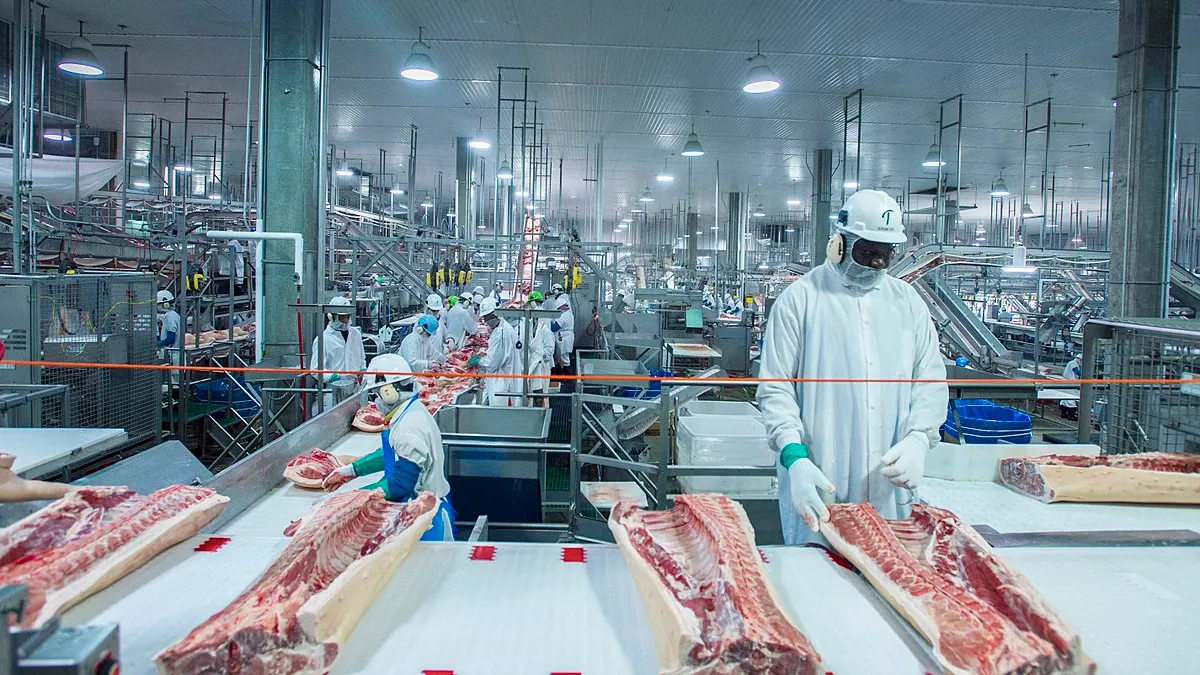UPDATE: April 16, 2020: Smithfield Foods will close an additional two plants in Cudahy, Wisconsin, and Martin City, Missouri, this week, the company announced in a press release Wednesday. The Missouri plant produces spiral and smoked hams using pork from the previously closed Sioux Falls, South Dakota, plant, which now has more than 500 cases of COVID-19 among its workers. The two added plants have "a small number" of workers that have tested positive and "are located in close proximity to urban areas in which community spread of COVID-19 has been prevalent," according to the release.
"The closure of our Martin City plant is part of the domino effect underway in our industry. It highlights the interdependence and interconnectivity of our food supply chain," said Smithfield CEO Kenneth Sullivan in a statement, emphasizing the company is complying with the Centers for Disease Control (CDC) guidance to mitigate the spread of the virus including "thermal scanning, personal protective equipment and physical barriers, to name a few."
Dive Brief:
- Smithfield Foods will cease operations at its Sioux Falls, South Dakota, pork processing plant indefinitely, the company announced in a Sunday press release. Smithfield originally intended to close a large part of the facility for three days "out of an abundance of caution for its 3,700 employees" after some workers tested positive for COVID-19, but South Dakota Governor Kristi Noem and Sioux Falls Mayor Paul TenHalen requested the company close the facility entirely for a minimum of 14 days in a letter to Smithfield CEO Kenneth Sullivan dated Saturday.
- At 238 active COVID-19 cases, positive tests among workers at the Smithfield plant represent more than half of the state's total according to the governor. The facility will process remaining inventory Tuesday, "consisting of millions of servings of protein," and continue to pay employees for two weeks, according to Smithfield's statement.
- "The closure of this facility, combined with a growing list of other protein plants that have shuttered across our industry, is pushing our country perilously close to the edge in terms of our meat supply. It is impossible to keep our grocery stores stocked if our plants are not running," Sullivan said.
Dive Insight:
Temporary closures at some of the U.S.'s largest meat processing plants have executives and meat supply chain stakeholders worried that large disruptions in processing will cause a devastating ripple effect upstream to livestock farmers and feed producers.
USDA data for animal protein production rates and cold storage volumes are updated near the end of each month therefore March figures do not show the impact of the most recent plant closures. The next data disclosure is April 28, according to the agency.
"These facility closures will also have severe, perhaps disastrous, repercussions for many in the supply chain, first and foremost our nation's livestock farmers. These farmers have nowhere to send their animals,” said Sullivan.
Cargill, Sanderson Farms, Tyson, JBS and Maple Leaf have all closed or significantly decreased output at U.S. and Canada facilities — affecting beef, poultry and pork supply chains.
But the case of Smithfield demonstrates how factory procedures must be adapted to slow the spread of the coronavirus or concerns about supply shortages will quickly be heightened by factory shutdowns. Several other meat processors are instituting substantial changes in their plants in an effort to minimize the spread of the virus.
Perdue is installing partitions between workers while installing infrared temperature checks and mandating face masks, according to a company release. And Tyson is instituting walk-through infrared temperature scanners in some facilities while doing so manually at others.
Vice President Pence urged food workers to continue their work Tuesday, saying "We need you to continue, as a part of what we call critical infrastructure, to show up and do your job," while pledging that the U.S. government would ensure worker safety.
"We believe it is our obligation to help feed the country, now more than ever. We have a stark choice as a nation: we are either going to produce food or not, even in the face of COVID-19,” Sullivan said in his Sunday statement.















